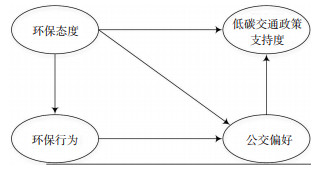Impacts of Environmental Concern on the Approval of Low-carbon Traffic Policy
-
摘要: 为减少汽车尾气污染,政府部门应制定交通政策推动出行者采用低碳出行方式。有效的交通政策需要深入了解影响出行者低碳出行的心理因素。通过实证分析,研究出行者环保态度、环保行为、公交偏好等潜在变量对低碳交通政策支持度的影响。基于结构方程模型(SEM模型)的基本原理,建立模型假设,并通过Mplus进行数据分析。研究发现,环保态度会直接影响环保行为、公交偏好,环保行为直接会影响公交偏好,公交偏好会直接影响低碳交通政策支持度;但环保态度和环保行为对低碳交通政策支持度没有直接效应。在95%的置信水平下,性别、婚姻状况、私家车拥有情况、房产拥有情况、是否开车上班对结构方程模型均无显著影响;但在90%的置信水平下,性别、教育程度对结构方程模型的影响显著。Abstract: The government should formulate transportation policies to encourage low-carbon travel, thereby reducing automobile exhaust pollution. Designing effective policy requires a thorough understanding of the psychological factors that influence low-carbon travel. The structural equation model(SEM)is used to study the impacts of environmental concern on the approval of the low-carbon transportation policy. Based on the basic principles of SEM, a model hypothesis is established, and the data is analyzed by Mplus. The results show that environmental attitudes directly influence environmental behaviors and public transportation preference. Meanwhile, environmental behaviors directly affect public transportation preference, and public transportation preference directly influences the approval of the low-carbon traffic policy. However, environmental attitudes and behaviors do not directly influence the approval of the low-carbon transportation policy. At the 95% confidence level, gender, marital status, private car ownership, house ownership, and whether or not drive to work have no significant effect on the SEM. However, at the 90% confidence level, gender and education level have significant effects on SEM.
-
表 1 显变量描述
Table 1. Description of indicators
潜在变量 显示变量 代码 外出购物时,携带购物袋 b1 环保行为 消费时尽量选择绿色产品 b2 参加环保活动 b3 我国环境污染和生态破坏已经十分严重 a1 汽车尾气产生了大量污染物 a2 环保态度 现阶段环境污染产生的问题十分多 a3 支持政府为了保护环境而制定更加严格的环境政策 a4 如果条件允许,我外出时会尽可能选择地铁 gU 公交偏好 如果条件允许,我外出时会尽可能选择公交车 gt2 政府应推动公共交通优先发展 gt3 制定政策减少市中心交通拥堵,如提高燃油税、停车费等 c1 低碳交通政策支持度 现在如果要买车,我会考虑选择电动汽车 c2 未来如果充电桩配套措施比较完善,我会优先选择电动车 c3 表 2 信度、收敛效度与区别效度分析表
Table 2. Reliability, convergence validity, and discriminate validity
参量 标准化荷载 组成信度 平均变异数萃取量 环保行为 环保态度 公交偏好 低碳交通政策支持度 环保行为 0.686~0.822 0.793 0.562 0.750 环保态度 0.821~0.914 0.880 0.651 0.416 0.807 公交偏好 0.771~0.875 0.872 0.695 0.451 0.739 0.834 低碳交通政策支持度 0.549~0.916 0.785 0.559 0.337 0.585 0.626 0.748 表 3 模型检验指标结果
Table 3. Fitness of the model
RMSEA CFI TLI SRMR 标准 $ \leqslant 0.08$ $\geqslant 0.9 $ $ \geqslant 0.9$ $ \quad <0.08$ 模型值 0.061 0.952 0.934 0.041 表 4 潜在变量对低碳交通政策支持度的影响
Table 4. Effect of latent variables on the approval of the low-carbon transportation policy
参量 直接效应 间接效应 总效应 环保态度 0.286* 0.350* 0.636* 环保行为 0.037 0.064* 0.101* 公交偏好 0.392* 0.000* 0.392* 注:*号数字表示在95%置信水平下显著。 表 5 各模型检验指标结果
Table 5. Fitness of models
分组 RMSEA CFI TLI SRMR 婚姻 0.049 0.949 0.941 0.065 私家车拥有情况 0.052 0.945 0.937 0.056 房产拥有情况 0.050 0.948 0.940 0.059 是否开车上班 0.050 0.952 0.945 0.058 性别 0.045 0.957 0.950 0.060 教育程度 0.050 0.947 0.939 0.069 表 6 各因素对结构方程的影响
Table 6. Impacts of the demographic characteristic on SEM
分组 卡方值差异 自由度 P 婚姻 5.611 6 0.468 1 私家车拥有情况 3.312 6 0.768 8 房产拥有情况 2.658 6 0.850 4 是否开车上班 9.016 6 0.172 7 性别 11.331 6 0.078 7 教育程度 10.827 6 0.093 9 -
[1] 李文霞, 张春民, 马昌喜. 多目标低碳车辆路径优化模型及求解算法[J]. 交通信息与安全, 2020, 38(1): 118-126+144. https://www.cnki.com.cn/Article/CJFDTOTAL-JTJS202001018.htmLI Wenxia, ZHANG Chunmin, MA Changxi. Path optimization model and solving algorithm for multi-objective low-carbon vehicle[J]. Journal of Transport Information and Safety, 2020, 38 (1): 118-126+144. (in Chinese) https://www.cnki.com.cn/Article/CJFDTOTAL-JTJS202001018.htm [2] TAM K P, CHAN H W, et al. Environmental concern has a weaker association with pro-environmental behavior in some societies than others: A cross-cultural psychology perspective[J]. Journal of Environmental Psychology, 2017, 53(1): 213-223. http://www.sciencedirect.com/science/article/pii/S0272494417301068 [3] BAMBERG S, MOSER G, et al. Twenty years after hines, hungerford, and tomera: A new meta-analysis of psycho-social determinants of pro-environmental behaviour[J]. Journal of Environmental Psychology, 2007, 27(1): 14-25. doi: 10.1016/j.jenvp.2006.12.002 [4] 刘建荣, 郝小妮. 考虑环保意识的低碳出行行为研究[J]. 交通运输系统工程与信息, 2019, 19(1): 26-32.LIU Jianrong, HAO Xiaoni. Research on low-carbon travel behavior considering environmental awareness[J]. Transportation Systems Engineering and Information Technology, 2019, 19 (1): 26-32. (in Chinese) [5] 陈坚, 张弛, 庹永恒, 等. 考虑环保意识和出行习惯的公交出行选择行为模型[J]. 交通运输系统工程与信息, 2020, 20 (4): 128-135. https://www.cnki.com.cn/Article/CJFDTOTAL-YSXT202004019.htmCHEN Jian, ZHANG Chi, TUO Yongheng, et al. A public transportation choice behavior model considering environmental awareness and travel habits[J]. Transportation Systems Engineering and Information Technology, 2020, 20(4): 128-135. (in Chinese) https://www.cnki.com.cn/Article/CJFDTOTAL-YSXT202004019.htm [6] 王丽丽, 张晓杰. 城市居民参与环境治理行为的影响因素分析: 基于计划行为和规范激活理论[J]. 湖南农业大学学报(社会科学版), 2017, 18(6): 92-98.WANG Lili, ZHANG Xiaojie. Factors affecting urban residents' participation in environmental governance: An empirical analysis based on TPB and NAM[J]. Journal of Hunan Agricultural University(Social Sciences Edition), 2017, 18(6): 92-98. (in Chinese) [7] JEKRIA N, DAUD S. Environmental concern and recycling behaviour[J]. Procedia Economics and Finance, 2016, 35(1): 667-673. http://www.sciencedirect.com/science/article/pii/S2212567116000824 [8] ROBERTS J, GURLEEN P, ROSEMARY H. Do environmental concerns affect commuting choices?Hybrid choice modelling with household survey data[J]. Journal of the Royal Statistical Society: Series A (Statistics in Society), 2018, 181(1): 299-320. doi: 10.1111/rssa.12274 [9] 方晓平, 周倩然. 基于TPB的低碳交通出行方式研究[J]. 铁道科学与工程学报, 2019, 16(3): 804-811.FANG Xiaoping, ZHOU Qianran. Research on low-carbon transportation mode based on TPB[J]. Journal of Railway Science and Engineering, 2019, 16(3): 804-811. (in Chinese) [10] BOUSCASSE H, JOLY I, BONNEL P. How does environmental concern influence mode choice habits? Mediation analysis[J]. Transportation Research Part D: Transport and Environment, 2018, 59(1): 205-222. http://smartsearch.nstl.gov.cn/paper_detail.html?id=ade3d7ac7ef0ddf042aa3d9da8c5e411 [11] BRUDERER E H. Air travel for private purposes, an analysis of airport access, income and environmental concern in switzerland[J]. Journal of Transport Geography, 2017, 61 (2): 1-8. http://www.sciencedirect.com/science/article/pii/S0966692316301016 [12] ALCOCK I, WHITE M P, TAYLOR T, et al. 'Green' on the ground but not in the air: Pro-environmental attitudes are related to household behaviours but not discretionary air travel[J]. Global Environmental Change, 2017, 42(1): 136-147. http://www.sciencedirect.com/science/article/pii/S095937801630543X [13] RHEAD R, ELLIOT M, UPHAM P. Using latent class analysis to produce a typology of environmental concern in the uk[J]. Social Science Research, 2018, 74(1): 210-222. http://www.sciencedirect.com/science/article/pii/S0049089X18306793 [14] 王玉君, 韩冬临. 经济发展、环境污染与公众环保行为: 基于中国CGSS2013数据的多层分析[J]. 中国人民大学学报, 2016, 30(2): 79-92.WANG Yujun, HAN Donglin. Economic development, environmental pollution and public pro-environmental behavior: A multi-level analysis of the 2013 chinese general social survey[J]. Journal of Renmin University of China, 2016, 30(2): 79-92. (in Chinese) [15] 陈坚, 傅志妍, 钟异莹, 等. 心理因素影响的公交方式选择行为模型[J]. 交通运输系统工程与信息, 2017, 17(3): 120-126+142.CHEN Jian, FU Zhiyan, ZHONG Yiying, et al. Psychological factors influencing the behavior model of bus route choice[J]. Transportation Systems Engineering and Information Technology, 2017, 17(3): 120-126+142. (in Chinese) [16] DAS S, PANDIT D. Importance of user perception in evaluating level of service for bus transit for a developing country like india: A review[J]. Transport Reviews, 2013, 33(4): 402-420. doi: 10.1080/01441647.2013.789571 [17] 张梦涵. 基于计划行为理论的公众参与交通拥堵治理行为研究[D]. 哈尔滨: 哈尔滨工业大学, 2020.ZHANG Menghan. A study on public participation in traffic congested control based on the theory of planned behavior[D]. Harbin: HarbinInstitute of Technology, 2020. (in Chinese) [18] ERIKSSON L, FORWARD S E. Is the intention to travel in a pro-environmental manner and the intention to use the car determined by different factors?[J]. Transportation Research Part D: Transport and Environment, 2011, 16(5): 372-376. http://www.sciencedirect.com/science/article/pii/S1361920911000289 [19] 严海, 王熙蕊, 梁文博, 等. 基于结构方程模型的通勤交通方式选择[J]. 北京工业大学学报, 2015, 41(4): 590-596. https://www.cnki.com.cn/Article/CJFDTOTAL-BJGD201504018.htmYAN Hai, WANG Xirui, LIANG Wenbo, et al. Commuter traffic mode selection based on structural equation mode[J]. Journal of Beijing University of Technology, 2015, 41(4): 590-596. (in Chinese) https://www.cnki.com.cn/Article/CJFDTOTAL-BJGD201504018.htm -





 下载:
下载:




